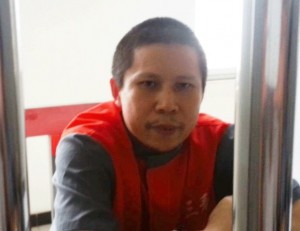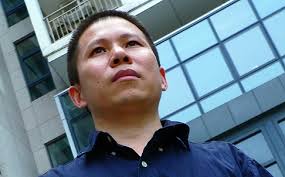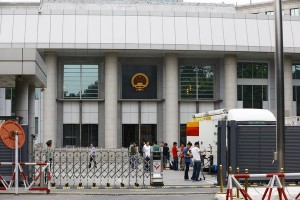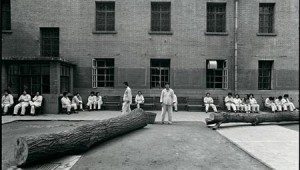Fuzzy Jurisdiction & Four Years: The Xu Zhiyong Verdict
On Sunday, in a verdict that surprised no one, the Beijing No. 1 Intermediate Court found human rights lawyer Xu Zhiyong guilty of gathering crowds to disrupt public order (Criminal Law Article 296). The Court sentenced Xu to four years, only one year shy of the maximum.
The Court’s verdict which runs close to twenty pages when converted to a word document, details the prosecutor’s evidence that formed the basis of the Court’s decision. The length of the document itself belies a Court confident in its decision on a case that they know the world was watching.
There is certainly much to be parsed out in the decision but one thing that is interesting are the jurisdictional issues that China Law & Policy raised last week prior to Xu’s trial. Namely, why Xu – who is being accused of the same crimes as many of the other defendants – was being tried in an higher level court, Beijing’s No. 1 Intermediate Court, while his compatriots are being tried in the lower level Haidian People’s Court.
The verdict attempts directly answers this question and in doing so present a frightening future for defendants:
对于被告人及其辩护人在庭前及庭审中对管辖及分案审理所提的异议,经查,本案事实涉及北京市海淀区、朝阳区及西城区等属于不同法院管辖的区域,北京市人民检察院第一分院对许志永一案向我院提起公诉后,北京市高级人民法院依照《中华人民共和国刑事诉讼法》第二十六条之规定,指定由我院管辖。鉴于公诉机关在起诉书中明确指控了犯罪事实,并附有案卷材料及证据,符合《中华人民共和国刑事诉讼法》第一百八十一条的规定,我院依法应当受理并开庭审判。对于共同犯罪案件是否并案审理,人民法院、人民检察院、公安机关依法均可以在各自职责范围内决定。被告人及其辩护人所提上述异议不能成立,本院不予支持。
The Court acknowledges defense counsel’s two jurisdictional-based objections: (1) that the Intermediate Court should not hear the case and (2)
Xu’s case should be tried with the other defendants. According to the Court, its jurisdiction is based upon Article 26 of China’s Criminal Procedure Law (“CPL”), a provision that permits a higher level court to re-assign cases to other courts when jurisdiction is unclear. According to the Court, because the Haidian District, the Chaoyang District and the Xidan District People’s courts all had jurisdiction over the case (presumably because some of the public demonstrations accorded in each of those districts), the prosecutor filed his case with the Intermediate Court and the Beijing Municipal Higher People’s Court determined that the Beijing No. 1 Intermediate Court could hear the case, thus giving it jurisdiction.
The verdict pays no mind to defense counsel’s objections; it does not explain what these objections were let alone why the Court rejected them. By flat out ignoring these objections, the Court seems to imply that as long as the law was followed by the prosecutor and the courts, then the decision will be permitted regardless of defense counsel’s arguments. Unfortunately, this does seem to be what Article 26 says although neither the Interpretation of the Supreme People’s Court on the Implementation of the CPL (“SPC Interpretation”) nor the Interpretation of the Supreme People’s Procuratorate on the Implementation of the CPL (“SPP Interpretation”) explicitly permit the prosecutor to file a criminal case with a higher level court. Although at the same time, it does not forbid it.
While there might be a basis in law to permit the Intermediate Court to have jurisdiction, what there appears no basis for is the Court’s cursory denial of defense counsel’s request to try the other defendants with Xu. In a two sentence analysis, the Court states that under the law it is within the discretion of either the Court, the prosecutor or the public security organs to decide whether joint defendants should be tried separately. The Court fails to cite any provision of any law or regulation that states that premise.
As for defense counsel’s objection – which convincingly cited to Article 13 of the SPP Interpretation requiring all cases to be joined before a higher court if one is to be heard there – the Court conclusory stated that defense counsel’s objection was “untenable” (不能成立) and therefore the Court was right to reject it. The verdict provides no reason or explanation as to why the objection was untenable. Given that defense counsel was able to sight to regulation for its argument and the Court here cites to no law, defense counsel’s objection seems worlds more tenable than anything the Court provided.
But that would be for a trial that was based on rule of law, something that is missing here where the Court rules by executive fiat regardless of laws of regulations. For all the Chinese Communist Party’s recent rhetoric about the need to have a “strict adherence to legal procedure,” the CCP again chose to ignore that procedure in the one case where it felt like its power was being threatened.
 On Facebook
On Facebook By Email
By Email 









